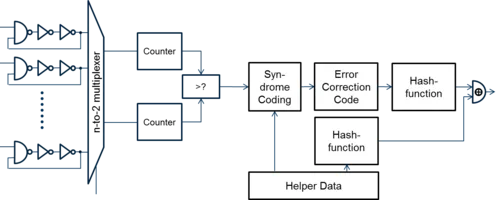Interdisciplinary Projects
A Consolidated PUF Test Suite
Description
For a practical usage, we want the responses of Physical Unclonable Functions (PUFs) to be unpredictable for an attacker, but reproducible for a legitimate user—intuitive criteria which need to be specified in the form of statistical tests to be useful for a practical evaluation. Practical tests range from simple ones, e.g. calculating the bias of the responses (bit 1 should be as likely as a 0 overall), to more complex tests like estimating spatial correlations between response bits. Each checks for a different aspect, pointing towards particular classes of possible issues.
The aim of this work is to consolidate existing tooling for the assessment of PUFs from measurement data into a newly built framework. The targeted end result is a common test suite which is
- generic regarding the concrete dataset, its data format, its dimensions, and the applicable tests,
- extensible, i.e. includes the currently existing tests but can be easily adapted to cover additional ones, and
- maintainable and auditable to allow for confidence in the correctness of the results.
Prerequisites
- Required: Significant experience with Python and numpy, as well as Python bindings in compiled languages
- Required: Experience in architecting extensible and maintainable software
- Beneficial: Experience with analysis of multidimensional data
- Beneficial: Background on statistical tests
- Optional: Background knowledge on PUFs
Contact
If you are interested in this work, please contact me via email with a short CV and grade report. We will then arrange a short meeting where we can discuss the details.
Jonas Ruchti, M.Sc.
Technical University of Munich, Chair of Security in Information Technology
Room N1010
E-Mail: j.ruchti@tum.de
Supervisor:
Research Internships (Forschungspraxis)
A Consolidated PUF Test Suite
Description
For a practical usage, we want the responses of Physical Unclonable Functions (PUFs) to be unpredictable for an attacker, but reproducible for a legitimate user—intuitive criteria which need to be specified in the form of statistical tests to be useful for a practical evaluation. Practical tests range from simple ones, e.g. calculating the bias of the responses (bit 1 should be as likely as a 0 overall), to more complex tests like estimating spatial correlations between response bits. Each checks for a different aspect, pointing towards particular classes of possible issues.
The aim of this work is to consolidate existing tooling for the assessment of PUFs from measurement data into a newly built framework. The targeted end result is a common test suite which is
- generic regarding the concrete dataset, its data format, its dimensions, and the applicable tests,
- extensible, i.e. includes the currently existing tests but can be easily adapted to cover additional ones, and
- maintainable and auditable to allow for confidence in the correctness of the results.
Prerequisites
- Required: Significant experience with Python and numpy, as well as Python bindings in compiled languages
- Required: Experience in architecting extensible and maintainable software
- Beneficial: Experience with analysis of multidimensional data
- Beneficial: Background on statistical tests
- Optional: Background knowledge on PUFs
Contact
If you are interested in this work, please contact me via email with a short CV and grade report. We will then arrange a short meeting where we can discuss the details.
Jonas Ruchti, M.Sc.
Technical University of Munich, Chair of Security in Information Technology
Room N1010
E-Mail: j.ruchti@tum.de
Supervisor:
Internships
A Consolidated PUF Test Suite
Description
For a practical usage, we want the responses of Physical Unclonable Functions (PUFs) to be unpredictable for an attacker, but reproducible for a legitimate user—intuitive criteria which need to be specified in the form of statistical tests to be useful for a practical evaluation. Practical tests range from simple ones, e.g. calculating the bias of the responses (bit 1 should be as likely as a 0 overall), to more complex tests like estimating spatial correlations between response bits. Each checks for a different aspect, pointing towards particular classes of possible issues.
The aim of this work is to consolidate existing tooling for the assessment of PUFs from measurement data into a newly built framework. The targeted end result is a common test suite which is
- generic regarding the concrete dataset, its data format, its dimensions, and the applicable tests,
- extensible, i.e. includes the currently existing tests but can be easily adapted to cover additional ones, and
- maintainable and auditable to allow for confidence in the correctness of the results.
Prerequisites
- Required: Significant experience with Python and numpy, as well as Python bindings in compiled languages
- Required: Experience in architecting extensible and maintainable software
- Beneficial: Experience with analysis of multidimensional data
- Beneficial: Background on statistical tests
- Optional: Background knowledge on PUFs
Contact
If you are interested in this work, please contact me via email with a short CV and grade report. We will then arrange a short meeting where we can discuss the details.
Jonas Ruchti, M.Sc.
Technical University of Munich, Chair of Security in Information Technology
Room N1010
E-Mail: j.ruchti@tum.de
